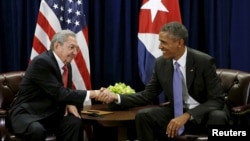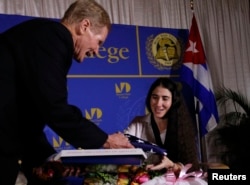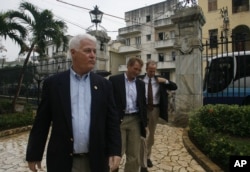President Barack Obama has invited U.S. lawmakers of both parties to join him on a history-making trip to Cuba later this month. Although the full list has not been revealed, numerous senators have confirmed receiving the invitation.
The Senate’s longest-serving current member, Democrat Patrick Leahy, promptly accepted the White House invitation.
“I’ve been there many, many times and just want to improve relations between our two countries,” Leahy said.
Republican Jeff Flake also will accompany Obama to Cuba March 20-22.
“Excited to do it,” Flake said. “I’m glad the president’s going. This is a big deal, and it will be good for the Cuban people.”
“You’ve seen a significant increase in private sector activity in Cuba, which makes for far better human rights conditions for a lot of Cubans," Flake added. "Up to 25 percent of the Cuban workforce is outside of the government sector now. That’s a huge deal. And that is traced, basically, to the president lifting restrictions on Cuban American travel, restrictions on remittances. The president’s done a good thing here."
By contrast, Democrat Bill Nelson, whose home state of Florida is home to many Cuban-Americans, turned down the invitation.
“They invited me to go along and I cannot go,” Nelson said. “I don’t want any attendance by me as Florida’s senior senator that would in any way be interpreted that you overlook the human rights abuses of Castro in Cuba. It’s not time for me to go.”
Bipartisan invitations
Observers say it is appropriate – and smart – for the administration to invite lawmakers of both parties.
“For the U.S. policy to stick, it has to be bipartisan and it has to be representative of the Republican voices that want a new relationship with Cuba,” said Marc Hanson of the Washington Office on Latin America.
Many high-profile senators will be absent from Air Force One. Both the chairman of the Senate Foreign Relations Committee, Republican Bob Corker, and the ranking Democrat, Ben Cardin, said they were invited but cannot make the trip with Obama.
“I’ve been travelling non-stop,” Corker said. “I’ve got things back home that I need to do. I appreciate the invitation, but I’m not going to be able to make the trip.”
“The administration invited me,” Cardin said. “I’m scheduled to be in another part of the world, and I couldn’t change that.”
Republican Jerry Moran also cited a scheduling conflict but praised U.S. agricultural sales to Cuba that benefit farmers in his home state of Kansas.
“Economic ties create greater pressure on the Cuban government to change the nature of its relationship, between the government and its people," said Moran. "I think economic opportunities create greater demands for personal freedoms and liberties, and so I think the two are related.”
Asked if he supports Obama’s diplomatic opening with Cuba, Moran would only say, “After 50-60 years, we might try something different.”
Trip's benefits
Several Democrats not invited told VOA they would like to visit Cuba at some point. And several Republicans said they were glad not to have been invited.
“Of course not, why would they invite me?” said Republican Senator John McCain, who had this to say when asked if he would want to accompany Obama to Cuba: “I’d just as soon have a root canal.”
In 1995, McCain hailed the normalization of relations between the United States and another communist-run nation, Vietnam. Today, he insists there is no comparison between that episode and Obama’s opening with Havana.
“We worked for 10 years; we worked with the president of the United States; we worked on both sides of the aisle,” McCain said. “We accounted for the people missing in action [in Vietnam], and so everybody was together when we did it. This [opening with Cuba] is just an executive order. This is the difference between Bill Clinton and Barack Obama.”
Cardin sees value in the trip
“Clearly the president is going to underscore the changes that we must see in Cuba on human rights,” Cardin said. “There’s a lot of potential in Cuba. But they still are not doing what is necessary on human rights. But through U.S. involvement, we will be able to see greater change.”
Corker is not so sure.
“Any additional steps that may or may not be taken down there [U.S. policy changes to Cuba] really should be dependent on how the Castro government conducts themselves,” Corker said. “Our policies down there haven’t worked for decades. Now I think it’s very incumbent on the Castro administration to show that they are willing to make changes, especially on human rights.”
Democratic Senator Richard Durbin said he wants to accompany Obama to Cuba, and is attempting to rearrange his schedule to be able to do so.
“This president, I believe, has moved us to a new, more realistic level of foreign policy, engaging the Cubans, doing our best to open Cuba, so that new ideas, new thinking new opportunities can come to the island," said Durbin. "The president visits many countries where we disagree with their leadership and disagree with their policies. But he still tries to engage them and encourage them to move toward democratic standards. That is exactly what is happening here.”













